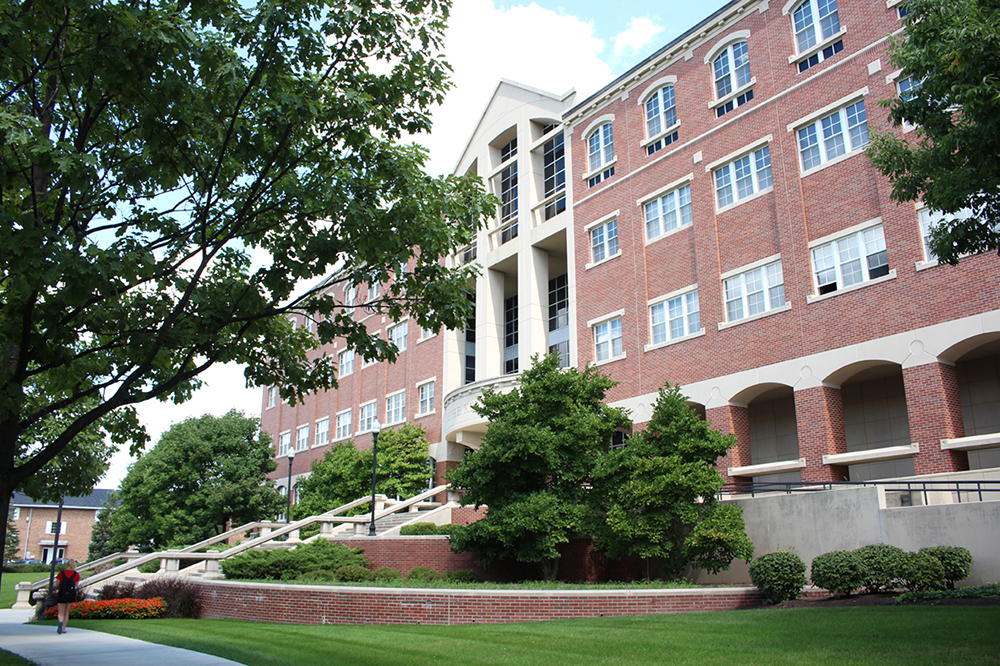
On Campus LL.M. & M.S.L. Frequently Asked Questions
Frequently Asked Questions
About the Programs
Q: What is the difference between the LL.M. and the M.S.L. degree?
A: The Master of Laws (LL.M.) is a professional degree designed for students from the United States or abroad who have earned a first degree in law. The Master in the Study of Law (M.S.L.) degree is for students from the United States or abroad who have no prior legal training and who hold at least a bachelor’s degree.
Q: Who is the ideal candidate for the LL.M. or M.S.L. degree at Dayton Law?
A: Ideal candidates for our LL.M. degree are individuals who have earned a first degree in law and who seek specialized training in the field of American and transnational law. This includes international students seeking to expand their knowledge of the U.S. legal system. The ideal candidate for Dayton’s M.S.L. degree is an individual who has earned at least a bachelor’s degree and does not want to practice law, but has a personal or professional interest in acquiring advanced knowledge of the U.S. legal system.
Q: If I start in the LL.M. or M.S.L. programs, can I transfer those credits to a J.D. degree?
A: To receive academic credit towards the J.D. degree, M.S.L. and international LL.M. students must first apply and be admitted to the law school’s J.D. program. Dayton Law’s academic policies do not permit academic credit earned in its LL.M. or M.S.L. degree programs to be applied towards the requirements of the J.D. degree.
Q: In what subjects can I earn an optional certificate of specialization?
A: We currently offer optional certificates in applied business, criminal, cyber, intellectual property and social justice law to students interested in pursuing an additional specialization.
Q: How long does it take to finish the LL.M. or M.S.L. program?
A: Full-time students can complete the requirements of the LL.M. or M.S.L. program in nine months. Part-time students must complete the program within four years. International LL.M. and all M.S.L. candidates must successfully complete 30 credit hours to obtain their degree. There is a 24-credit-hour requirement for LL.M. candidates with a J.D. from a U.S. law school. Some candidates may be eligible to receive transfer credit for previous coursework.
U.S. Bar Exam Eligibility
Q: Will an LL.M. degree allow me to sit for a U.S. Bar Exam if my first law degree was earned outside of the United States?
A: Earning an LL.M. degree does not guarantee eligibility to sit for a U.S. Bar Exam. Each State Bar determines its eligibility requirements. International students seeking to sit for a U.S. Bar Exam should diligently research State Bar requirements, as it is the student’s responsibility to insure that all State Bar requirements are met. This may require reviewing and understanding the requirements and deadlines listed on the State Bar’s website, or contacting the State Bar directly by phone or email if you have additional questions or need further clarification.
While Dayton Law does not guarantee bar eligibility and our LL.M. Program is not specifically designed as a U.S. bar preparation program, students who have met all other applicable bar qualifications may be able to use the credits earned through this program as part of the requirements for U.S. bar eligibility. We encourage students interested in taking a U.S. Bar Exam to review Chart 4 of the Comprehensive Guide to Bar Admission Requirements published by the National Conference of Bar Examiners, and to contact the State Bar for which they seek admission.
Admissions, Enrollments and Financial Aid
Q: When should I apply for graduate programs at the law school?
A: There is no firm deadline for applying to Dayton Law’s graduate programs. We use a rolling admissions system that allows us to be flexible with our admissions process. We recommend that you apply early so that you can make all the necessary plans to study at Dayton Law. Contact us if you have questions about the graduate programs admissions process. You can apply online at the Law School Admission Council’s website.
Q: Do you require any standardized tests with the application?
A: No standardized tests are required for the LL.M. application. All M.S.L. candidates must demonstrate strong academic performance in their undergraduate studies. Based on your GPA you may be required to take the Graduate Record Examination (GRE).
International students must demonstrate English proficiency and may submit a TOEFL or equivalent test score to fulfill this requirement.
Q: English is not my first language, should I still apply?
A: We require students to be proficient in English before they begin in the graduate programs. You may demonstrate English proficiency when you submit your application or you may apply for conditional admission and continue to work on your English language skills. Conditionally admitted students may attend the University of Dayton's Intensive English Program (IEP) prior to beginning at the School Law. The IEP offers offers courses in grammar, reading and writing, listening and speaking English as well as special courses in TOEFL preparation, the dynamics of the American classroom, research paper writing and pronunciation together with an immersion in the American culture and university experience.
Q: When can I begin taking classes as an admitted student?
A: Students may begin their studies in the fall or spring semesters.
Q: How much does an LL.M. or M.S.L. degree cost and how can I pay for it?
A: The law school charges tuition per credit hour, rather than per academic year. Therefore, tuition and costs may vary for each student. Most graduate students finance their degrees with a combination of personal resources and loans. Learn more about financial aid.
Career Services
Q: What opportunities are available to LL.M. and M.S.L. students after completing their programs?
A: Alumni of our programs have secured jobs in law firm, government, academic and corporate settings. International graduates can use their degrees and their experience at Dayton Law in their home countries or abroad to enhance their careers. Non-lawyer graduates can advance their existing careers, explore a new career, or may opt to continue studying in a law school setting to obtain their J.D.
Housing
Q: What type of housing is available for the law school’s graduate students?
A: Please visit our Housing Information page to learn more about housing options.

Phone: 937-229-3555
Email: llm_msl@udayton.edu
